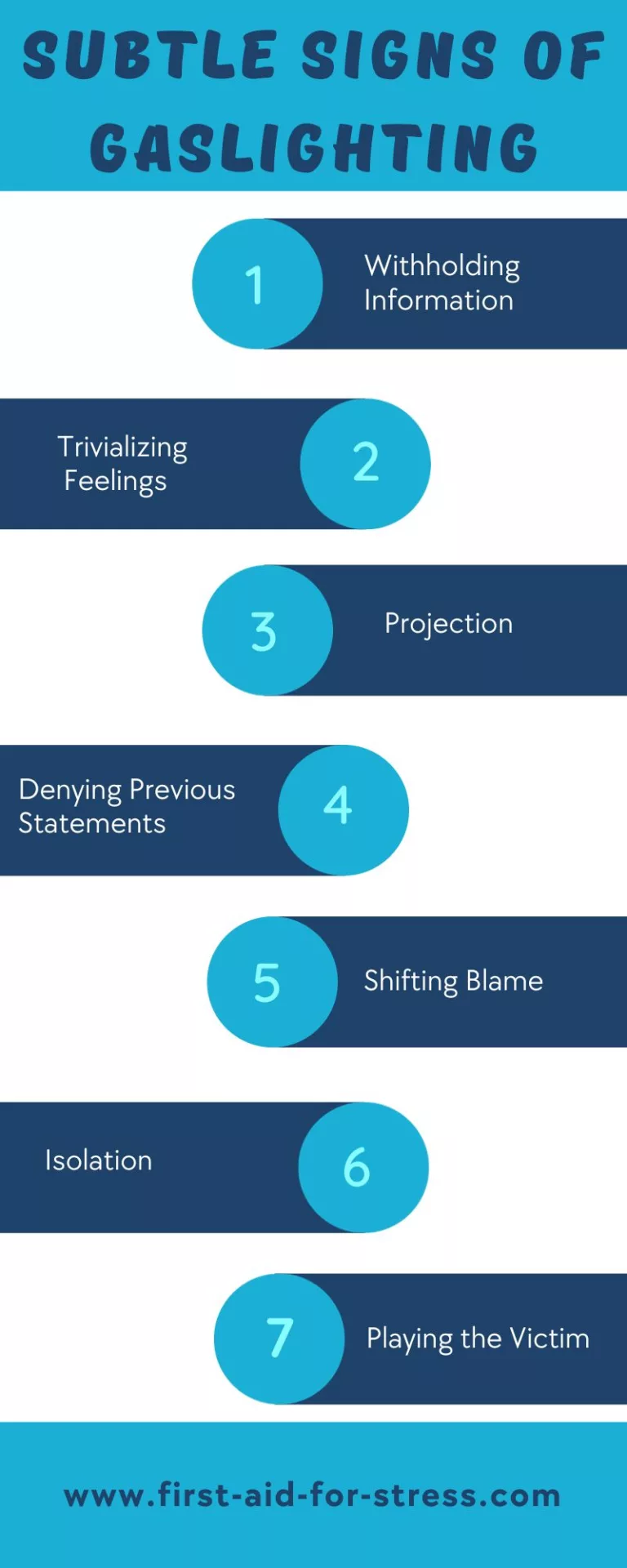Summary
Gaslighting in Relationships
Poor quality relationships cause a lot of stress. Whether that’s the relationship you have with yourself or with others.
Abusive/ toxic relationships which continue are highly likely to create chronic stress and poor mental and physical health, including but not, exclusively PTSD. You can be embroiled at any time during child or adulthood. They result in behaviour adaptation we, implement coping strategies which include people-pleasing, playing it small, becoming hypersensitive to other people’s needs while discounting our own and addiction—all to avoid the feelings and situations created by another.
While Unit 7 of the First Aid For Stress Program is dedicated solely to freeing yourself from toxic relationships, I felt it essential to raise your awareness, from the start of this course, to what or who causes your stress.
The ‘biggie’ in toxic relationships, I feel, is Gaslighting. People who gaslight others are narcissists, sociopaths or psychopathic; the result of their actions cause confusion, anxiety and depression.

What is Gaslighting?
While this term originated from the play Gaslight (1938), I notice that more and more people are using or are aware of it nowadays. It is the term for one form of emotional abuse whereby the perpetrator slowly, intentionally manipulates ‘truths’ causing the victim to doubt themselves, their perception of events and eventually their sanity.
Applied slowly, covertly, the gaslighting effect on the victim is significant. It creates the downward spiral into the three-stage process which, Hans Selye Grandfather of Stress, described in 1936. General Adaptation Syndrome (GAS).
Gaslighting has a cumulative effect.
Initially negatively affecting your mental and emotional health, if unaddressed, it harms your physical health. The long-term effects are significant.

Subtle Signs Of Gaslighting
Like all emotional manipulators, they do not value or respect you, nor do they care about your psychological/ physical well-being. Callous, insensitive and aggressive predators who initially appear to be fun, considerate, attentive, kind and loving but who randomly/ frequently shift to withhold their affection and attention creating the atmosphere that ‘there’s something wrong’. That you’ve done something wrong, this ploy is hugely effective to someone who doesn’t recognise it.
Being on a back foot is precisely where they want you, for it compels (victim) to create positivity within the relationship.
When the ‘temporary fix’ occurs, and the relationship reverts to being loving, attentive and romantic. Your doubts alleviated you are happy and ‘secure’, until the pattern repeats itself, and you hit another low. Before long, you experience an ever-increasing rollercoaster of emotional ups and downs depending on whether (s)he is holding back or offering you love, positivity and peace.
Before long, you are confused awash with blame, shame, guilt, uncertainty, doubt, fear (and love) which erodes your confidence, self-esteem and well-being.

Specific gaslighting tactics used by gaslighters
Withholding information:
The gaslighter may hide or distort information to keep the other person in the dark. They might omit details about where they’ve been or who they’ve been with, leaving the victim feeling unsure about the truth.
Trivializing feelings:
Gaslighters often downplay their partner’s emotions or concerns, making them feel as though their feelings are irrational or exaggerated. They might say things like, “You’re overreacting” or “You’re too sensitive.”
Projection:
Gaslighters may accuse their partner of behaviors or motives that they themselves are guilty of. This can cause the victim to question their own actions and intentions.
Denying previous statements:
Gaslighters might deny ever saying something they clearly stated before. This makes the victim question their memory and feel like they can’t trust their own recollection.
Shifting blame:
Gaslighters frequently shift blame onto their partner for things they didn’t do or for their own mistakes. This can leave the victim feeling guilty for things they are not responsible for.
Isolation:
Gaslighters may attempt to isolate their partner from friends and family, making them more dependent on the gaslighter for emotional support. This makes it easier for the gaslighter to manipulate and control the victim.
Playing the victim:
Gaslighters often portray themselves as the victim, even when they are the ones causing harm. They may use this tactic to garner sympathy and divert attention away from their own problematic behaviors.

Undoubtedly it is a significant cause of stress.
Suppose you do not recognise any form of manipulative or controlling behaviour fast. In that case, you are vulnerable to being used and abused – this could be in a personal/ intimate relationship, at work, by ‘friends’ family members, neighbours or total strangers.
There is only one line of defence, and that’s education and awareness.
“until you realise how easily it is for your mind to be manipulated, you remain the puppet of someone else’s game” Evita Ochel.
It is essential to realise that there are many opportunists in the world. Unscrupulous people have one plan to take advantage of another, to service their needs or desires. They are slick operators with a charming likeable persona who actively seek connection with someone committed, trusting, nurturing and kind.
Self – orientated, they find any opportunity to take advantage of and advance their agenda. They use the intense emotions of guilt, fear, shame and/or love against you.
Initially, they appear to be pleasant, part of your tribe and compassionate. Once you are ‘on-side’, the perpetrator withdraws affection, lies about or to you to manipulate you into doing what you don’t want to do. Their actions are confusing. The result is that you question your value, memory, perspective and finally your sanity.
It is NOT your fault.
Please know you can heal. You can regain your confidence, self-esteem and self-worth. Know that information and awareness are the foundational blocks to rebuilding yourself. Know too that you are already on the way, over the next few weeks you will gain and implement skills which will elevate you to the point that you will never be as broken again. I know that for sure for I too, in the past, have been duped.
Eeek! This describes my partner/ boss/ co-worker/ friend/ family member.
If you find yourself in such a relationship, please don’t blame or criticise yourself, for it really doesn’t matter. The key is realising that you are in a one-sided, exploitative relationship which is harmful to both your mind and body and deciding whether it is worth salvaging or time to walk away.
What action should I take?
As I explained earlier, Unit 7 of the First Aid For Stress program is dedicated to toxic relationships – how to free yourself from them now and how to protect yourself in the future. In the meantime, understanding the stress process in the body is essential for you will be able to figure out exactly where you are on the spectrum of stress and the all-important ‘what to do’. Implementing micro changes will build your foundational resilience for BIG change in the future.
Get Your Stress Score
Know that I've got you and you've got this.
Our twice-weekly online meeting and step-by-step First Aid For Stress Program will support your progress. Together like a phoenix, we will rise from the ashes. 😊


